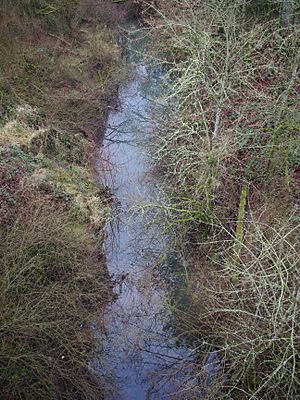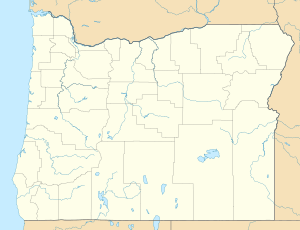Palmer Creek (Yamhill River tributary) facts for kids
Quick facts for kids Palmer Creek |
|
|---|---|

Palmer Creek from Oregon Route 221 at Dayton
|
|
|
Location of the mouth of Palmer Creek in Oregon
|
|
| Country | United States |
| State | Oregon |
| Region | Willamette Valley |
| County | Polk, Yamhill |
| City | Dayton |
| Physical characteristics | |
| Main source | Eola Hills Polk County 1,037 ft (316 m) 45°04′04″N 123°08′35″W / 45.06778°N 123.14306°W |
| River mouth | Yamhill River Dayton, Yamhill County 105 ft (32 m) 45°13′17″N 123°04′16″W / 45.22139°N 123.07111°W |
Palmer Creek is a small stream in northwestern Oregon, in the United States. It's a tributary, which means it's a smaller stream that flows into a larger one. Palmer Creek joins the Yamhill River.
The creek starts in Polk County. It then flows north into Yamhill County. Finally, it meets the Yamhill River near the town of Dayton. This meeting point is about 5 miles (8 km) upstream from where the Yamhill River joins the Willamette River.
Palmer Creek has two smaller streams that flow into it. These are called Holdridge Creek and West Fork Palmer Creek. The main part of Palmer Creek flows under Oregon Route 221 in Dayton.
Contents
About Palmer Creek
Where the Creek Flows
Palmer Creek was named after an early settler, Joel Palmer. Before that, it was known as Smith Creek. The creek flows through private farmland.
Water for Farms
Palmer Creek flows all year long. This is because water from the Willamette River is moved into the creek. This extra water helps farmers irrigate their crops. Irrigation means supplying water to land or crops to help them grow.
Fish in Palmer Creek
Types of Fish You Might See
Many different kinds of fish live in Palmer Creek. Some fish, like Coastal cutthroat trout, swim into Palmer Creek from the Yamhill River. They usually come during the autumn and winter. A few of them might stay through the summer months.
Other Fish Species
Other fish that live in the Yamhill River and the lower part of Palmer Creek include carp and goldfish. You might also find largescale sucker, chiselmouth, and redside shiner. Other common fish are peamouth chub, northern squawfish, sculpin, dace, and Pacific lamprey.
 | Delilah Pierce |
 | Gordon Parks |
 | Augusta Savage |
 | Charles Ethan Porter |


